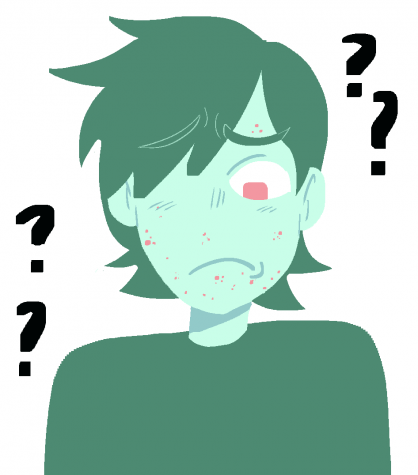Side Effect of Masks
To avoid being infected with COVID-19, people have been social distancing, quarantined, and wearing masks. But the use of protective equipment has created another enemy to fend off: acne.
Commonly known as maskne, acne mechanica is caused by friction and pressure on the skin. According to Loma Linda University Health, the heat from breathing combined with masks rubbing against the face increases breakouts. The trapped moisture clogs pores which cause acne.
Senior Carley Ryerson has taken critical steps to clear her skin.
“I started to use scrubs and face masks like two to three times a week,” Ryerson said. “The Shea moisture clay masks help a lot and keep your skin smooth.”
Of 44 students surveyed, 72.7% have noticed an increase in breakouts because of face masks. Studies reveal one solution for maskne is a change in diet.
“I avoid drinking soda,” Ryerson said. “I focus on water with ice.”
Senior Madison Stamper has also had to limit the amount of makeup she wears with a facemask.
“In the morning, I wash my face and then apply sunscreen and moisturizer,” Stamper said. “I remove any makeup I may have on, wash my face, and then twice a week I will use my peeling mask. After that, I follow up with moisturizer and serum.”
Although breakouts cannot be completely avoided, Harry Dao, a dermatologist for Loma Linda University, recommends cleansing your face before and after wearing a mask, limiting makeup, and applying moisturizer.
Sophomore Lauren Milligan suggests students should turn to online resources to learn about skincare and which products will best suit certain skin types for those who cannot visit a dermatologist.
“I know most people know who Hyram from TikTok is,” Milligan said. “Listen to him because you can go to Target or Wal-Mart and get CeraVe moisturizer and facial wash.”
Nowadays, most students have a TikTok account. A popular creator and skincare specialist on the app is Hyram Yarbro, otherwise known as “Skincare by Hyram”, which has recommended CeraVe skincare products. Ryerson, Stamper, and Milligan have all used either the CeraVe Cleanser or the CeraVe Daily Moisturizing Lotion. They have seen positive results from the products.
Another important step to help treat maskne is washing reusable masks. The Centers for Disease Control and Prevention (CDC) recommends washing masks after every use. Dr. Ryan Sinclair, an associate professor at Loma Linda University, says reusable masks carry bacteria such as E. coli and viruses. Built-up bacteria on cloth masks can harm the skin.
Even though wearing masks come with side effects, they are still essential during the pandemic.
“If you are concerned about the breakouts, just to remember that the skin you have now isn’t going to be there forever,” Stamper said. “Nearly everybody else is dealing with this problem, so you shouldn’t feel like you are the only one going through it.”






